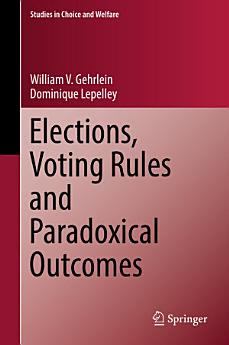Elections, Voting Rules and Paradoxical Outcomes
ກ່ຽວກັບປຶ້ມ e-book ນີ້
ກ່ຽວກັບຜູ້ຂຽນ
Dr. William V. Gehrlein is currently Professor Emeritus at University of Delaware (US), which he has been affiliated with since 1978. He has received a number of grants and awards, and has served on two journal editorial boards. His research interests have spanned the topics of statistics, operations management, and graph theory; with a primary focus on social choice theory. He has authored more than 150 publications, along with several books and edited volumes.
Dr. Dominique Lepelley received his Ph.D in Economics from the University of Caen. He is currently Professor at the University of La Réunion (France). He is primarily interested in social choice theory. More specifically, his work examines the properties of voting procedures and electoral systems. He served as a member of the editorial board of the journal Social Choice and Welfare and has authored more than 80 publications, including two books and one edited volume.




